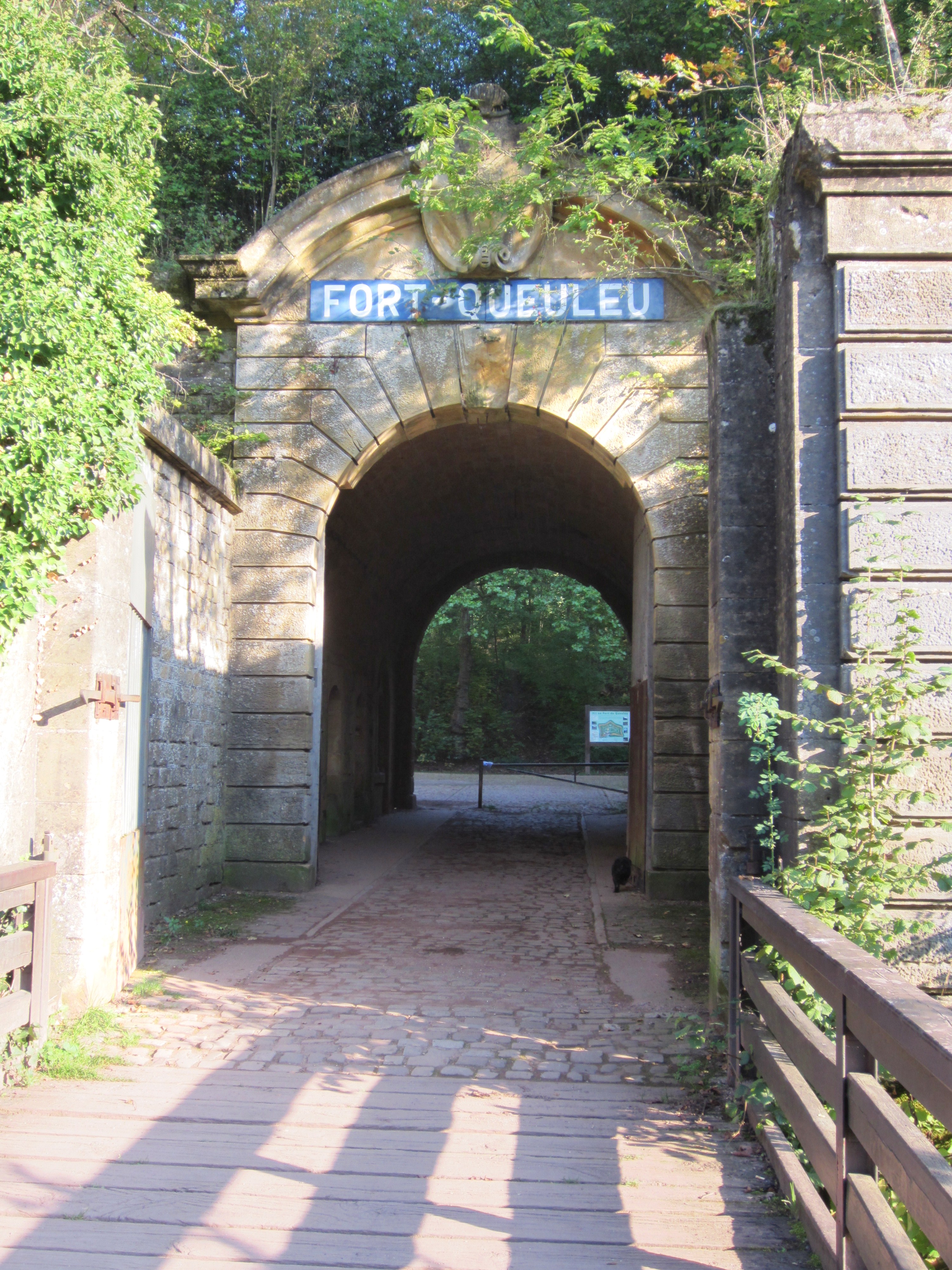
Copyrights <a href="https://en.wikipedia.org/wiki/fr:User:Aimelaime" class="extiw" title="w:fr:User:Aimelaime">Aimelaime</a> sur <a href="https://en.wikipedia.org/wiki/fr:" class="extiw" title="w:fr:">Wikipédia français</a>
France > Grand Est > Moselle > 57000 > Metz > Caserne II / Casemate A #### Allée Jean Burger
The fort of Queuleu belongs to the first fortified belt linked to the defence of the city of Metz. The construction work, begun by the French during the Second Empire in 1867, was largely taken over by the Germans during the first annexation following the defeat of 1870-1871. Then with the construction of the second fortified belt of Metz from 1899 onwards, the fort of Queuleu lost its strategic interest, however, and the works carried out there were light During the Second World War, the fort was used as barracks for French soldiers. Following the defeat of 1940, the fort was briefly used as a detention camp for prisoners of war (Stalag). Then between March 1943 and September 1944, the Natzweiler-Struthof concentration camp (Bas-Rhin) set up an annex mainly for the service of the SS. Around 100 prisoners, mainly ordinary Germans and Poles, were attached to it. Some of them took part in work on the Metz-Frescaty aerodrome. Between October 1943 and August 1944, a special camp (Sonderlager) managed by the Gestapo was set up in Barracks II. Between 1500 and 1800 prisoners (women and men) were interrogated and interned there before being sent to concentration camps (Natzweiler-Struthof, Dachau...), reformatory camps (Schirmeck) or prisons. In the special camp at Fort Queuleu, resistance fighters, saboteurs, smugglers, resistance fighters, hostages and Russian prisoners were interned. Most of them are locked up in overcrowded collective cells, without the possibility of washing, talking or moving under the ferocious surveillance of SS guards and Commander Georg Hempen. Resistance leaders are isolated in individual cells, dark and damp dungeons to which only the commander has access. Police officers "industrialize" interrogation and use torture. The conditions of internment are terrible and most of the prisoners are parked blindfolded with their hands and feet bound. Thirty-six people died in the fort and four people managed to escape in April 1944 During the liberation of Metz, the fort was the object of fighting between 17 and 21 November 1944, during battles between the American army and the German troops entrenched in the fort. The fort was bombed and suffered considerable damage before surrendering. A Centre de Séjour Surveillé was established by the French administration in the fort between December 1944 and March 1946. Initially reserved for German civilians and their families, the site also served as a place of detention for administrative internees arrested for collaboration, propaganda, anti-patriotism or denunciation (up to 4,400 people were interned there). It is one of the most important centres of its kind on French territory. Foreigners of different nationalities are interned there (Germans, Spaniards, French, Italians, Luxembourgers, Poles, Yugoslavs...). Between 1946 and 1947, a German prisoner of war camp was set up in the fort. Finally, between 1948 and 1950, Indochinese workers occupied the site. Located at the entrance of the fort, the monument of resistance and deportation, inaugurated in 1977, today marks the entrance to the place of memory. Regular guided tours of Barracks II/Casemate A, given by the association's volunteers, are offered for most of Sunday afternoon (dates available on www.fort-queuleu.com). Each tour lasts approximately one hour. Reservations are not necessary and the tours are free of charge. However, donations are very much appreciated in order to participate in the maintenance and restoration work. There is a shop at the site reception after the wooden footbridge (books, postcards...). Access to the buildings is strictly forbidden outside these visits (video surveillance and intrusion alarms). The fitness trail and the marked trails can be used during the fort's opening hours (opening hours available on http://metz.fr/lieux/lieu-210.php). Special visits can also be arranged during the week by appointment for groups. Barracks II/Casemate A is unfortunately inaccessible to persons with reduced mobility due to the presence of stairs. However, special adapted tours can be arranged by appointment.

Copyrights <a href="https://en.wikipedia.org/wiki/fr:User:Aimelaime" class="extiw" title="w:fr:User:Aimelaime">Aimelaime</a> sur <a href="https://en.wikipedia.org/wiki/fr:" class="extiw" title="w:fr:">Wikipédia français</a>
A proximité:
Datatourism data updated on: 2022-11-05 05:05:19.595